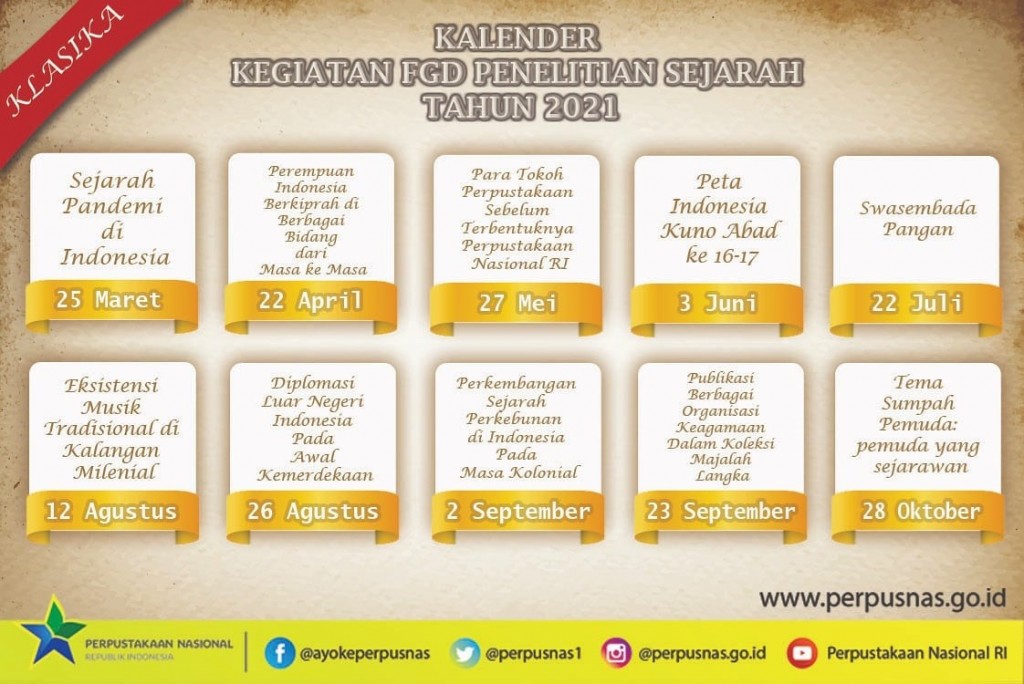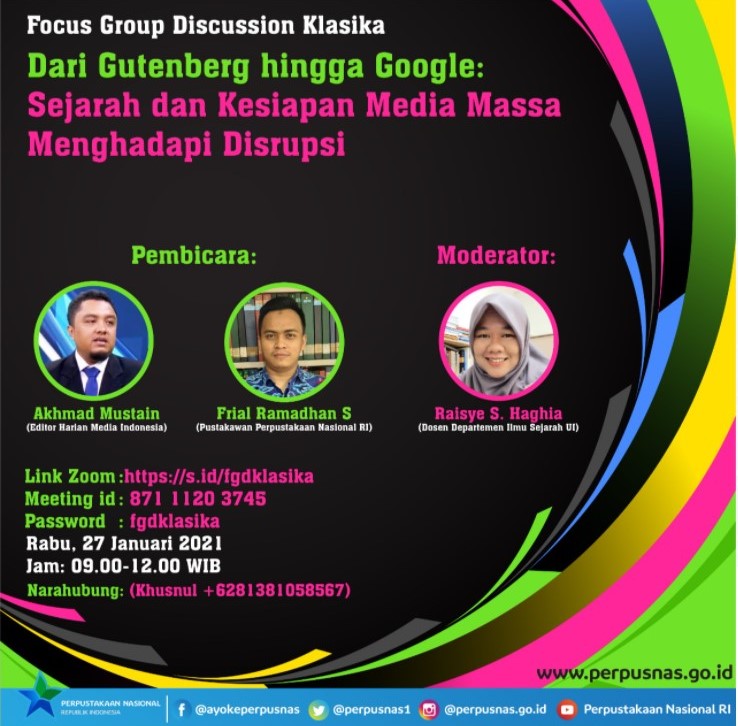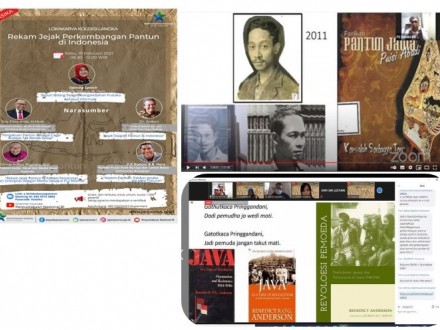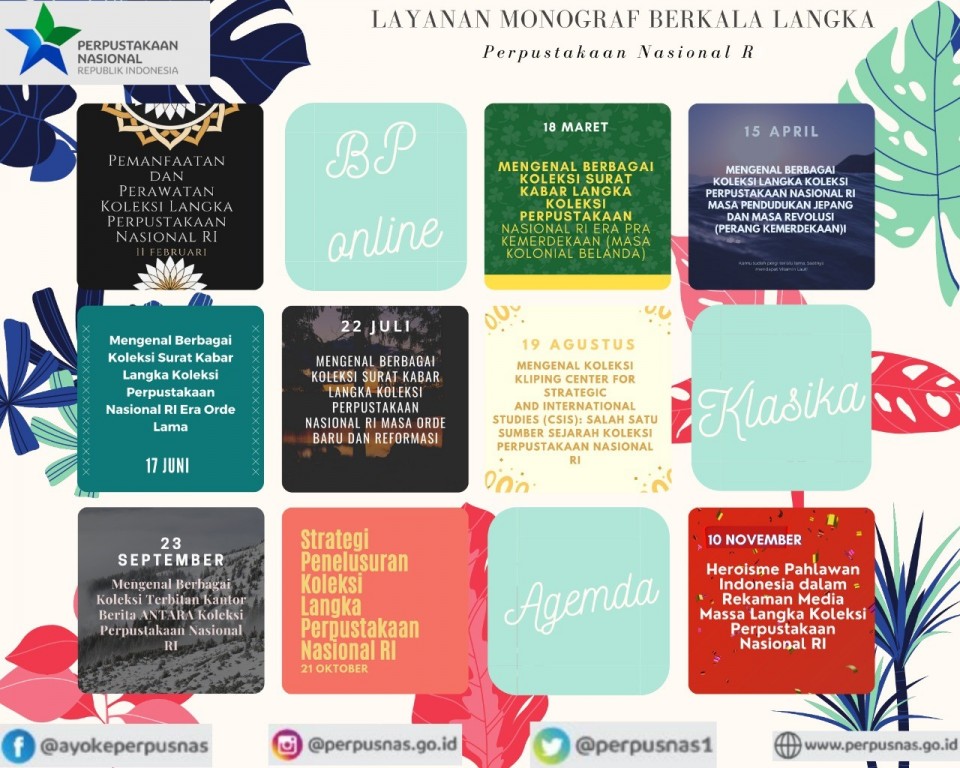PROMOTING NATIONAL LIBRARY OF INDONESIA’S RARE COLLECTION DURING THE PANDEMIC ERA
15 May 2021
Since the outbreak of the COVID-19 pandemic in early 2020, research activities have been disrupted. Many students and researchers cannot visit the library easily to find the resources they need. Prior to the outbreak of the pandemic, the National Library of Indonesia (NLI) was often visited by researchers, students and people both from local and foreign countries. However, the COVID-19 pandemic disrupted this activity suddenly. We believe that people’s information needs continue to exist and therefore we keep delivering our library services digitally and undertake online activities.
NLI has been preparing and executing several online activities in order to fulfill people’s information needs and to educate users during this pandemic. The activities comprise workshops and seminars on current topics in library management and services, such as library services transformation, nation literacy index in relation to nation cultural index, user education and online focus group discussions (FGD) titled Historical Research FGD and Manuscript FGD.
This article will explore the FGD, workshop, and user education activities to explain NLI’s efforts to reach communities, give people access to rich information resources in the library and educate people to deal with the pandemic smartly. The Division of Rare Collection conducted its first FGD on 27 January 2021, via a Zoom meeting and YouTube live streaming (https://youtu.be/k5a_hRvZYnM). The theme was “From Gutenberg to Google: The Mass Media Readiness in Facing Disruption”. The FGD was attended by many participants from various backgrounds, including students, researchers and employees.

Capture 1: The Calendar of the FGD

Capture 2: FGD’s Flyer
The aim of the FGD was to educate people that the world has been facing disruption since the old times and therefore the disruption this day is not a new thing. We can learn how to deal with the disruption from the history of mass media development from the time when Johannes Gutenberg discovered printing machine to the present digital era. The NLI librarian explained the history recorded in NLI’s rare newspapers. He also promoted NLI’s rich rare newspaper collections. As at March 2021, there are 1,877 rare newspapers in 26,383 bundles and 140,717 exemplars plus 1,498 titles of scrapbooks (clippings). They serve as main resources of historical research. The rare newspapers consist of newspapers published before and during the Dutch colonial period in 19th century. The promotion is to encourage the consciousness of youth to preserve and protect rare newspapers and other rare collections as part of the precious Indonesian national heritage.

Capture 3: Happenings of the FGD
On 10 February 2021, NLI conducted a workshop titled “The Recorded Trace of Pantun and its Growth in Indonesia” over video teleconference. The workshop was attended by 588 participants and viewed 3,552 times on YouTube. This theme is interesting because pantun has been recognised as part of the intangible world cultural heritage by UNESCO in December 2020. NLI held the workshop to celebrate this award.
There were four speakers at the pantun workshop. They are General Secretary of Cultural Directorate, Ministry of Education and Culture, lecturer of Andalas state university, audio visual practitioner from the Ministry of Communication and Informatics, and a researcher of Brawijaya University. Pantun is a form of traditional Malay poetry which is composed in four lines and rhymes. It is often practised in several ceremonies, such as wedding parties and even in formal meetings. Pantun is also becoming a part of Indonesian and Malaysian daily life. During the workshop, participants were required to submit a self-made pantun in order to stimulate creativity and innovation among participants. The young generation was invited to create pantun in order to build a sense of ownership. Furthermore, we also wanted to promote NLI’s collections and facilities to participants as NLI owns many collections of pantun.

Capture 4: The Flyer and Performance of Pantun Workshop
The last activity to be explained in this article is NLI’s user education. These activities are planned as a series, to be held nine times this year from February to November 2021. The first themed programme invited three librarians from the Division of Rare Collection as speakers to educate people on how rare collection is preserved.
It is hoped that these activities would motivate people to increase literacy activities during the pandemic period.

Capture 5: The Calendar of the NLI User Education